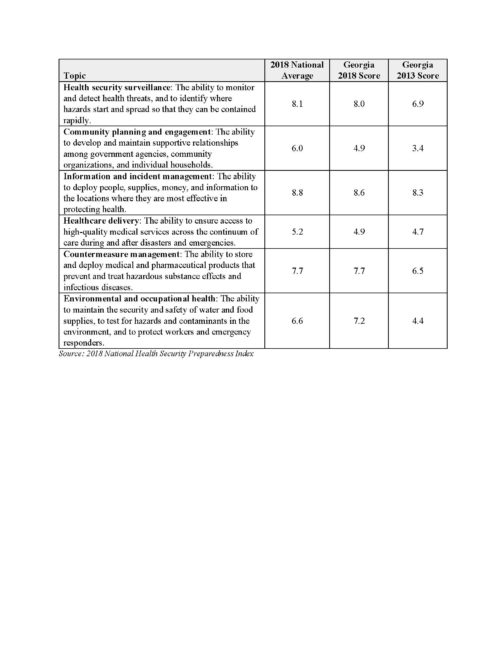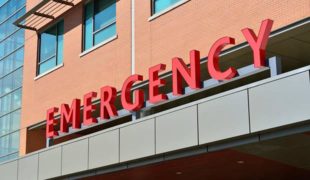Georgia’s preparedness for managing health emergencies is improving but still lags behind the national average, according to a newly released report.
The state scored a 6.8 on a 10-point scale for preparedness, in an index that shows the ability to protect Americans’ health from incidents such as newly emerging infectious diseases; an increase in resistance to antibiotics; terrorism; and extreme weather conditions.
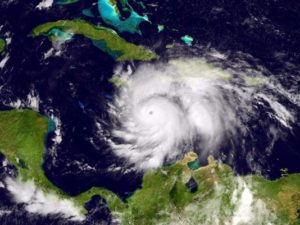
The 2018 National Health Security Preparedness Index, released this week by the Robert Wood Johnson Foundation, found the nation’s overall preparedness had improved. The highest state, Maryland, received an 8.0 score. The national average was 7.1.
The index analyzes 140 measures — such as flu vaccination rates and the number of pediatricians available — to calculate a composite score.
Most states showed improvements, with just four showing declines in health security and eight staying flat, said Glen Mays of the University of Kentucky. He directs the index, which was originally developed by the CDC.
Generally, states in the Deep South and Mountain West regions have lower health security levels than other areas, the analysis found.
Many Southern states have “larger segments of the population with lower socioeconomic status,’’ Mays told GHN this week.
“Georgia has definitely been improving,’’ Mays added, citing its score in Environmental and Occupational Health, which surpassed the national average. He also said the state’s ability to monitor and detect health hazards was close to the average.
But the state lagged in its ability to develop relationships among government agencies, community organizations, and individual households on health security.
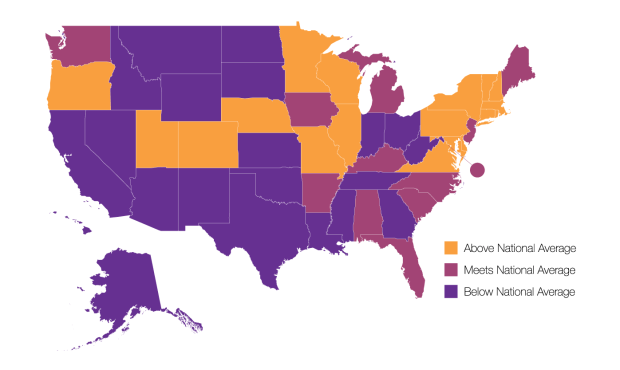
The Georgia Department of Public Health, responding to the report, noted that the state has improved significantly since 2013, the first year of the index. Agency spokeswoman Nancy Nydam said, “There are situations unfolding every day in the world that we hope we never see in Georgia, but we must prepare and plan for them anyway.’’
Nydam pointed out that Public Health has no actual control over many of the 140 things measured in the index, such as how many homes in the state have broadband communications, or the structural integrity of bridges, or the percentage of hospitals with a top quality ranking on safety. But she said the agency cooperates with others to promote overall preparedness.
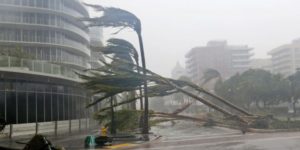
“The index is a tool for identifying strengths and gaps in the protections needed to keep people safe and healthy in the face of large-scale threats to public health,’’ she said. “So while many of the measures do not fall under the direct purview of Public Health – they affect the health of the public, hence the critical need for dialogue and collaboration among agencies and partners.’’
Mays, the index director, said states are improving their preparedness at different rates, thus creating “a widening disparity in health security across states.’’
“Threats to America’s health security are on the rise, but so is our nation’s preparedness to deal with these emergencies,” Alonzo Plough, a vice president at the Robert Wood Johnson Foundation, said in a statement. “The Index shows how prepared public and private stakeholders are to tackle health security challenges and sheds light on areas for improvement.”
Separately, the FEMA administrator addressed a conference in Savannah this week, urging more hurricane preparedness for the area.
The Savannah Morning News reported that FEMA chief Brock Long, a former Savannah resident, told the meeting of emergency managers that even after a busy 2017 hurricane season — in which Hurricanes Harvey, Maria and Irma brought widespread disaster — he’s not sure Georgians understand the risk.
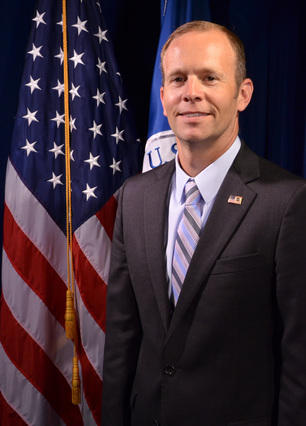
“I think Georgia is a ticking time bomb.’’ Long said, according to the newspaper. “I think you’ve got a complacent citizenry. I don’t think they realize the Georgia coast got hit 14 times from 1850 to 1900.”
But Dennis Jones, director of the Chatham Emergency Management Agency, said he doesn’t consider residents of Chatham County, where Savannah is located, to be “complacent.”
“In our community, with us going through Matthew [in 2016] and Irma, I think people in our community [are] well-educated and they understand what the threats to our community are,” he said.
It’s all about getting individuals ready, Jones said.
“That means looking at building codes to make sure we’re not building in a location that’s prone to significant flooding,” he said, according to the Morning News.
“When something is damaged” by disasters, Jones added, his agency encourages “building it back better so that it minimizes the impact of a future damage later on.” And he said his organization is preparing for potential disasters by promoting knowledge among the public and pursuing “hazard mitigation” efforts.
